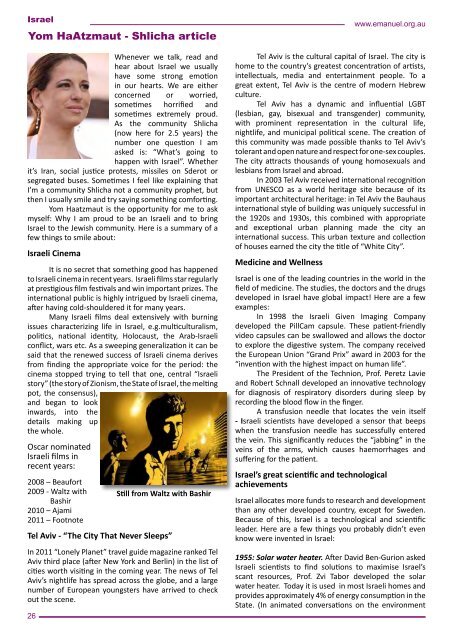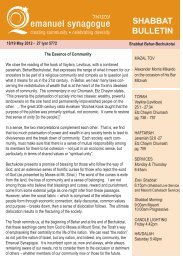TELL May - July 2012 - Emanuel Synagogue
TELL May - July 2012 - Emanuel Synagogue
TELL May - July 2012 - Emanuel Synagogue
You also want an ePaper? Increase the reach of your titles
YUMPU automatically turns print PDFs into web optimized ePapers that Google loves.
Israel<br />
Yom HaAtzmaut - Shlicha article<br />
Whenever we talk, read and<br />
hear about Israel we usually<br />
have some strong emotion<br />
in our hearts. We are either<br />
concerned or worried,<br />
sometimes horrified and<br />
sometimes extremely proud.<br />
As the community Shlicha<br />
(now here for 2.5 years) the<br />
number one question I am<br />
asked is: “What’s going to<br />
happen with Israel”. Whether<br />
it’s Iran, social justice protests, missiles on Sderot or<br />
segregated buses. Sometimes I feel like explaining that<br />
I’m a community Shlicha not a community prophet, but<br />
then I usually smile and try saying something comforting.<br />
Yom Haatzmaut is the opportunity for me to ask<br />
myself: Why I am proud to be an Israeli and to bring<br />
Israel to the Jewish community. Here is a summary of a<br />
few things to smile about:<br />
Israeli Cinema<br />
It is no secret that something good has happened<br />
to Israeli cinema in recent years. Israeli films star regularly<br />
at prestigious film festivals and win important prizes. The<br />
international public is highly intrigued by Israeli cinema,<br />
after having cold-shouldered it for many years.<br />
Many Israeli films deal extensively with burning<br />
issues characterizing life in Israel, e.g.multiculturalism,<br />
politics, national identity, Holocaust, the Arab-Israeli<br />
conflict, wars etc. As a sweeping generalization it can be<br />
said that the renewed success of Israeli cinema derives<br />
from finding the appropriate voice for the period: the<br />
cinema stopped trying to tell that one, central “Israeli<br />
story” (the story of Zionism, the State of Israel, the melting<br />
pot, the consensus),<br />
and began to look<br />
inwards, into the<br />
details making up<br />
the whole.<br />
Oscar nominated<br />
Israeli films in<br />
recent years:<br />
2008 – Beaufort<br />
2009 - Waltz with<br />
Bashir<br />
2010 – Ajami<br />
2011 – Footnote<br />
26<br />
Still from Waltz with Bashir<br />
Tel Aviv - “The City That Never Sleeps”<br />
In 2011 “Lonely Planet” travel guide magazine ranked Tel<br />
Aviv third place (after New York and Berlin) in the list of<br />
cities worth visiting in the coming year. The news of Tel<br />
Aviv’s nightlife has spread across the globe, and a large<br />
number of European youngsters have arrived to check<br />
out the scene.<br />
www.emanuel.org.au<br />
Tel Aviv is the cultural capital of Israel. The city is<br />
home to the country’s greatest concentration of artists,<br />
intellectuals, media and entertainment people. To a<br />
great extent, Tel Aviv is the centre of modern Hebrew<br />
culture.<br />
Tel Aviv has a dynamic and influential LGBT<br />
(lesbian, gay, bisexual and transgender) community,<br />
with prominent representation in the cultural life,<br />
nightlife, and municipal political scene. The creation of<br />
this community was made possible thanks to Tel Aviv’s<br />
tolerant and open nature and respect for one-sex couples.<br />
The city attracts thousands of young homosexuals and<br />
lesbians from Israel and abroad.<br />
In 2003 Tel Aviv received international recognition<br />
from UNESCO as a world heritage site because of its<br />
important architectural heritage: in Tel Aviv the Bauhaus<br />
international style of building was uniquely successful in<br />
the 1920s and 1930s, this combined with appropriate<br />
and exceptional urban planning made the city an<br />
international success. This urban texture and collection<br />
of houses earned the city the title of “White City”.<br />
Medicine and Wellness<br />
Israel is one of the leading countries in the world in the<br />
field of medicine. The studies, the doctors and the drugs<br />
developed in Israel have global impact! Here are a few<br />
examples:<br />
In 1998 the Israeli Given Imaging Company<br />
developed the PillCam capsule. These patient-friendly<br />
video capsules can be swallowed and allows the doctor<br />
to explore the digestive system. The company received<br />
the European Union “Grand Prix” award in 2003 for the<br />
“invention with the highest impact on human life”.<br />
The President of the Technion, Prof. Peretz Lavie<br />
and Robert Schnall developed an innovative technology<br />
for diagnosis of respiratory disorders during sleep by<br />
recording the blood flow in the finger.<br />
A transfusion needle that locates the vein itself<br />
- Israeli scientists have developed a sensor that beeps<br />
when the transfusion needle has successfully entered<br />
the vein. This significantly reduces the “jabbing” in the<br />
veins of the arms, which causes haemorrhages and<br />
suffering for the patient.<br />
Israel’s great scientific and technological<br />
achievements<br />
Israel allocates more funds to research and development<br />
than any other developed country, except for Sweden.<br />
Because of this, Israel is a technological and scientific<br />
leader. Here are a few things you probably didn’t even<br />
know were invented in Israel:<br />
1955: Solar water heater. After David Ben-Gurion asked<br />
Israeli scientists to find solutions to maximise Israel’s<br />
scant resources, Prof. Zvi Tabor developed the solar<br />
water heater. Today it is used in most Israeli homes and<br />
provides approximately 4% of energy consumption in the<br />
State. (In animated conversations on the environment







